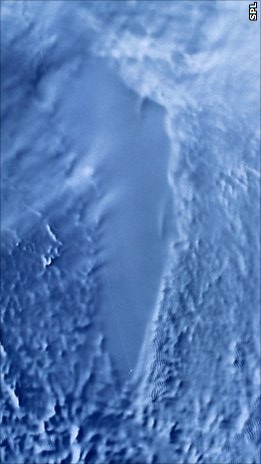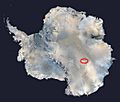Lake Vostok facts for kids
Quick facts for kids Lake Vostok |
|
|---|---|

|
|
| Coordinates | 77°0′S 105°0′E / 77.000°S 105.000°E |
| Type | subglacial rift lake |
| Basin countries | (Antarctica) |
| Max. length | 250 km |
| Max. width | 50 km |
| Surface area | 15,690 km² |
| Average depth | 344 m |
| Max. depth | 1,000 m |
| Water volume | 5,400 ± 1,600 km³ |
| Residence time | 1,000,000 yrs |
| Islands | 1 (found May 2005) |
| Settlements | Vostok Station |
Lake Vostok is the largest of many lakes hidden deep beneath the ice in Antarctica. It's located at 77° S 105° E, right under Russia's Vostok Station. This amazing lake is buried about 4,000 meters (13,000 feet) below the surface of the ice.
Scientists from Russia and Britain discovered Lake Vostok. They used special radar equipment to "see" through the thick ice and find it. The lake holds fresh water, even though its temperature is around -3 °C. Water usually freezes at 0 °C, but the huge pressure from the ice above keeps the water liquid.
Lake Vostok is divided into two separate parts, or basins. A ridge separates these two sections. Some scientists think that the types of living things, or ecosystems, in each basin might be different.
Contents
A Unique Environment Under the Ice
Lake Vostok is a very unusual place. It is an oligotrophic environment, which means it has very few nutrients. It is also packed with a lot of oxygen. The amount of oxygen in Lake Vostok is about fifty times higher than what you would find in a normal freshwater lake on Earth.
Why So Much Oxygen?
The incredible weight of the ice sheet above Lake Vostok helps create this high oxygen level. Oxygen from the ice slowly dissolves into the lake water. Also, oxygen and other gases are trapped in special structures called clathrates. These clathrates are like tiny cages made of ice that hold gases. They form because of the very high pressure deep in the lake. If these clathrates were brought to the surface, they would become unstable and release the trapped gases.
Could There Be Life in Lake Vostok?
No other natural place on Earth has so much oxygen. This means that if any life forms exist in Lake Vostok, they would need to be very special. They would have to adapt to these extremely high oxygen levels to survive. One way they might do this is by having a lot of protective enzymes.
Searching for Life Beyond Earth
The conditions in Lake Vostok are very similar to what scientists think might be found on Jupiter's moon Europa or Saturn's moon Enceladus. Because of this, finding life in Lake Vostok would make it more likely that life could also exist on one of these distant moons.
- "Miles Below Antarctic Ice, a Freshwater Lake May Harbor Ancient Life." Robert Lee Hotz, The Los Angeles Times.
Images for kids
-
Location of Lake Vostok in East Antarctica
-
Ice cores drilled at Vostok Station, which is seen in the background
See also
 In Spanish: Lago Vostok para niños
In Spanish: Lago Vostok para niños
 | John T. Biggers |
 | Thomas Blackshear |
 | Mark Bradford |
 | Beverly Buchanan |





